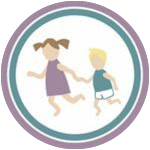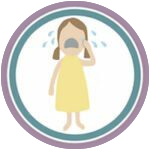One of my online readers recently wrote to me with this question:
My 9-year-old son is not reading, and not even interested in learning to read. He recognizes letters and can identify some words, but has no passion for mastering the skill. We read to him a lot, but we’re worried about this delay, and especially about his lack of interest. What do you suggest?
I have always been perplexed by the rush to get children to read. Why dictate a certain age for reading? Why not trust the child to acquire what he needs when he is ready? What if later is better? Could reading bring to an end some of the incredible abilities we marvel at in young children— their magical memory, acute hearing, imagination, vivid experiences, and exuberant artistic expressions?
Imagine raising a non-reading human being: What contribution would he make with a different brain wiring, free of dependence on the written word? (We could write what he teaches us!) What are we missing by interrupting the child’s ways of perceiving the world with our cerebral focus on letters? Indeed, it would be amazing if we could prevent even one child from learning to read. I have no doubt that such a person, living in modern society, will become knowing and aware in ways we don’t realize are possible, and come up with ideas no reading human could conceive of.
Obviously, reading is also magical, and opens doors for the mind and for the imagination. But what’s the rush? For many children, reading later is better. There are so many advantages to learning to read at a later age. I would love to see more children who don’t rush to read before they maximize their brain potential. There is no need to either rush or halt children’s learning. We can trust each child to unfold as flowers do: right on time.
School-age Dictatorship
The anxiety over a child’s reading is the result of believing conventional thoughts that are rooted in school concepts, and in the need to control and shape children. School is about control of timing and methods. It teaches everything academic and hardly anything of imagination, spirit, music, art, dance, theater, spirituality, or dealing with emotions. We raise people who can build colorless and harsh-looking cities made of concrete; people who know the history of wars and are intimately familiar with computers, but have no idea how to feel, sing, relate, give, parent, dance, meditate, love, invent, or lead. When we keep a child out of school, we should also protect him from these school concepts.
When you meet adults who read, you will find no difference between the ones who started at 4 and those who mastered reading at 14.
Who would you be without your wish that your son should read now? How would you feel, when free of expectations and a timetable dictated by people who don’t even know your precious child? How would it be if you could cherish every moment of your child’s reading-free perspective on life?
Right on Time
Poet H.N. Bialik recalled his education growing up in Russia, and his failing attempts to read at school. His teachers kept pointing to letters, testing his knowledge, but all he saw were pictures of his own imagination. Each letter looked to him like something he had seen in real life. He didn’t see “letters,” but drawings, and could not shift his mind to see anything else. When he was asked, “What is this letter?” he insisted repeatedly, “A person carrying two buckets,” or whatever image it was he saw. A few years later, this very intelligent boy would have quickly learned to read with ease.
Only your son knows his own optimal time for learning to read. Your job is to protect his connection to himself so he can follow his inner guide. What distracts a child from optimal development are expectations, praise, or other hinted coercions that pull him away from trusting himself. Expose and nurture, but don’t impose.
Consequences of Premature Reading
As long as a child’s mind is focused on sensations, large movements, pictures, etc., reading may interrupt his inner process. An artistic child, or a very physical one, may utilize the senses in ways that contradicts the frozen state of the written text. In addition, if a child is jealous of a younger sibling, needing more time with his mother, or is not ready to be quietly by himself, he is not ready to read.
When coerced into reading, a child will interrupt some of his magical direction and switch to the kind of brain activity reading requires. In other words, he might “bend himself out of shape” mentally, emotionally, and possibly even physically, in order to live up to our anxious expectations.
There are children who are ready to read at a young age. One of my children taught himself to read through music, at age 4. He was a born intellectual. He studied as a toddler. He was hardly interested in climbing, or the playground or amusement park (his younger brother was on the rides while he waited with me). I kept reading to him, even though he could read English and music. My youngest son was a later reader. To this day, I do not know when and how he taught himself to read; I was not involved.
When we extract the child from his world of perception to impose our own, something gets lost. The greatest loss is the child’s sense that he can rely on himself to know when, how, and what to learn and to do with himself.
Inventing One’s Own Method
When your son learns to read in his own way and time, he will not only learn to read, he will invent a learning method. The process of inventing a system to figure something out is far more important than what is being learned.
When we teach a child to read, not only may we miss the timing, but we might also prevent him from inventing his own method. We thwart a gigantic brain development and the building block of confidence and self-reliance. In addition, we make learning to read more difficult when the method doesn’t fit the child’s way of learning.
A child who knows from experience that he can learn anything on his own is poised to be able to study with confidence and ease for the rest of his life. His mind will have no imprint of anxiety about learning. Once the formative years are over, the self-reliant learner has an easy time following instructions and discerning what is useful to him. His connection to himself as the source is alive.
No Expectations
Enjoy your son’s amazing ways of being. Avoid showing any interest in seeing him read or even be interested in reading. Tell him you were wrong, and that it’s better if he doesn’t read soon. Relieve him of any likely sense of expectation. Tell him how much you love to read to him. Then, enjoy as his magical years unfold.
When your child is driven from inside to learn to read, you won’t be able to stop him. In fact, my silly idea of raising a child who won’t learn to read is not possible in our society. We cannot stop children from learning to speak, read, or do any of the things we all do. We can only watch in dismay.
 This article appeared in Pathways to Family Wellness magazine, Issue #67.
This article appeared in Pathways to Family Wellness magazine, Issue #67.
View Article Resources.
To purchase this issue, Order Here









